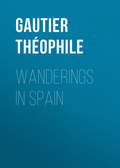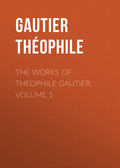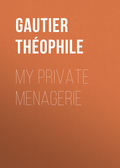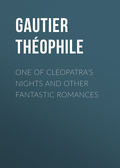полная версия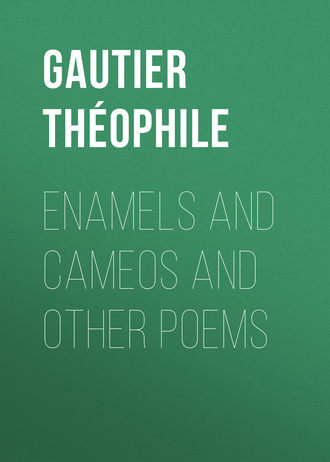

Gautier Théophile
Enamels and Cameos and other Poems
NOSTALGIA OF THE OBELISKS
THE OBELISK IN PARIS
Distant from my native land,
Ever dull with ennui's pain,
Lonely monolith I stand,
In the snow and frost and rain.
And my shaft, once burnt to red
In a flaming heaven's glare,
Taketh on a pallor dead
In this never azure air.
Oh, to stand again before
Luxor's pylons, and the dear,
Grim Colossi! – be once more
My vermilion brother near!
Oh, to pierce the changeless blue,
Where of old my peak upwon,
With my shadow sharp and true
Trace the footsteps of the sun!
Once, O Rameses! my tall mass
Not the ages could destroy.
But it fell cut down like grass.
Paris took it for a toy.
Now my granite form behold:
Sentinel the livelong day
Twixt a spurious temple old,
And the Chambre des Députés!
On the spot where Louis Seize
Died, they set me, meaningless,
With my secret which outweighs
Cycles of forgetfulness.
Sparrows lean defile my head,
Where the ibis used to light,
And the fierce gypaetus spread
Talons gold and plumage white.
And the Seine, the drip of street,
Unclean river, crime's abyss,
Now befouls mine ancient feet,
Which the Nile was wont to kiss:
Hoary Nile that, crowned and stern,
To its lotus-laden shores
From its ever bended urn
Crocodiles for gudgeon pours!
Golden chariots gem-belit
Of the Pharaohs' pageanting
Grazed my side the cab-wheels hit,
Bearing out the last poor king.
By my granite shape of yore
Passed the priests, with stately pschent,
And the mystic boat upbore,
Emblemed and magnificent.
But to-day, profane and wan,
Camped between two fountains wide,
I behold the courtesan
In her carriage lounge with pride.
From the first of year to last
I must see the vulgar show —
Solons to the Council passed,
Lovers to the woods that go!
Oh, what skeletons abhorred,
Hence, an hundred years, this race!
Couched, unbandaged, on a board,
In a nailed coffin's place.
Never hypogeum kind,
Safe from foul corruption's fear;
Never hall where century-lined
Generations disappear!
Sacred soil of hieroglyph,
And of sacerdotal laws,
Where the Sphinx is waiting stiff,
Sharpening on the stone its claws, – ,
Soil of crypt where echoes part
Where the vulture swoopeth free,
All my being, – all my heart,
O mine Egypt, weeps for thee!
THE OBELISK IN LUXOR
Where the wasted columns brood,
Lonely sentinel stand I,
In eternal solitude
Facing all infinity.
Dumb, with beauty unendowed,
To the horizon limitless
Spreads earth's desert like a shroud
Stained by yellow suns that press.
While above it, blue and clean,
Is another desert cast —
Sky where cloud is never seen,
Pure, implacable, and vast.
And the Nile's great water-course
Glazed with leaden pellicle
Wrinkled by the river-horse
Gleameth dead, unlustreful.
All about the flaming isles,
By a turbid water spanned,
Hot, rapacious crocodiles
Swoon and sob upon the sand.
Perching motionless, alone,
Ibis, bird of classic fame,
From a carven slab of stone
Reads the moon-god's sacred name.
Jackals howl, hyenas grin,
Famished hawks descend and cry.
Down the heavy air they spin,
Commas black against the sky.
These the sounds of solitude,
Where the sphinxes yawn and doze,
Dull and passionless of mood,
Weary of their endless pose.
Child of sand's reflected shine,
And of sun-rays fiercely bent,
Is there ennui like to thine,
Spleen of luminous Orient?
Thou it was cried "Halt!" of yore
To satiety of kings.
Thou hast crushed me more and more
With thine awful weight of wings.
Here no zephyr of the sea
Wipes the tears from skies that fill.
Time himself leans wearily
On the palaces long still.
Naught shall touch the features terse
Of this dull, eternal spot.
In this changing universe,
Only Egypt changeth not!
When the ennui never ends,
And I yearn a friend to hold,
I've the fellahs, mummies, friends,
Of the dynasties of old.
I behold a pillar pale,
Or a chipped Colossus note,
Watch a distant, gleaming sail
Up and down the Nile afloat.
Oh, to seek my brother's side,
In a Paris wondrous, grand,
With his stately form to bide,
In the public place to stand!
For he looks on living men,
And they scan his pictures wrought
By an hieratic pen,
To be read by vision-thought.
Fountains fair as amethyst
On his granite lightly pour
All their irisated mist.
He is growing young once more.
Ah! yet he and I had birth
From Syene's veins of red.
But I keep my spot of earth.
He is living. I am dead.
VETERANS OF THE OLD GUARD
(December 15)
Driven by ennui from my room,
I walked along the Boulevard.
'Twas in December's mist and gloom.
A bitter wind was blowing hard.
And there I saw – strange thing to see! —
In drizzle and in daylight drear,
From out their dark abodes let free,
Dim, spectral shadow-shapes appear.
Yet 't is by night's uncanny hours,
By pallid German moonbeams cast
On old dilapidated towers,
That ghosts are wont to wander past.
It is by night's effulgent star
In dripping robes that elves intrigue
To bear beneath the nenuphar
Their dancer dead of his fatigue.
At night's mysterious tide hath been
The great review – of ballad writs —
Wherein the Emperor, dimly seen,
Numbered the shades of Austerlitz.
But phantoms near the Gymnase? — yea,
And wet and miry phantoms, too,
And close to the Variétés,
And not a shroud to trick the view!
With yellow teeth and stained dress,
And mossy skull and pierced shoon,
Paris – Montmartre – behold it press, —
Death in the very light of noon!
Ah, 't is a picture to be seen!
Three veteran ghosts in uniform
Of the Old Guard, and, spare and lean,
Two ghost-hussars in daylight's storm.
The lithograph, you would surmise,
Wherein one ray shines down upon
The dead, that Raffet deifies,
That pass and shout "Napoleon!"
No dead are these, whom nightly drum
May rouse to battle fires that burn,
But stragglers of the Old Guard, come
To celebrate the grand return!
Since fighting in the fight supreme,
One has grown thin, another stout;
The coats that fitted once now seem
Too small, too loose, or draggled out.
O epic rags! O tatters light,
Starred with a cross! Heroic things
Of ridicule, ye gleam more bright,
More beautiful than robes of kings!
Limp feathers fluttering adorn
The tawny colbacks worn and grim.
The bullet and the moth have torn
And riddled well the dolmans dim.
Their leathern breeches loosely hang
In furrows on their lank thigh-bones,
Their rusty sabres drag and clang,
As heavily they scrape the stones.
Or some round belly firm and fat,
Squeezed tight in tether labour-donned,
Makes mirth and jest to chuckle at —
Old hero quaint and cheveroned!
But do not mock and jeer, my lad.
Salute him, rather, and, believe,
Achilles he, of Iliad
That Homer's self could not conceive.
Respect these men with battle signs
That twenty skies have painted brown;
Their scars that lengthen out the lines
Of wrinkles age has written down;
Their skin whose colour deep and dun,
Bared to the fronts of many foes,
Tells us of Egypt's burning sun;
Their locks that tell of Russia's snows.
And if they shake, no longer strong?
Ah! Beresina's wind was cold.
And if they limp? The way was long,
From Cairo unto Vilna told.
If they be stiff? They'd but a flag
For sheet to hold their bodies warm.
And if a sleeve be loose, poor rag?
'T is that a bullet tore an arm.
Mock not these veteran shapes bizarre,
At whom the urchin laughs and gapes.
They were the day, of which we are
The evening, and the night, perhaps, —
Remembering if we forget —
Red lancer, grenadier in blue,
With faces to the Column set,
As to their only altar true.
There, proud of pain each scar denotes,
And of long miseries gone by,
They feel beneath their shabby coats
The heart of France beat mightily.
And so our smiles are steeped in tears,
Seeing this holy carnival,
This picture wan that reappears,
Like morning after midnight's ball.
And, cleaving heaven its own to claim,
Wide the Grand Army's eagle spreads
Its golden wings, like glory's flame,
Above their dear and hallowed heads.
SEA-GLOOM
The sea-gulls restless gleam and glance,
The mad white coursers cleave the length
Of ocean as they rear and prance
And toss their manes in stormy strength.
The day is ending. Raindrops choke
The sunset furnaces. The gloom
Brings the great steamboat spitting smoke,
And beating down its long black plume.
And I, more wan than heaven wide,
For land of soot and fog am bound,
For land of smoke and suicide —
And right good weather have I found!
How eagerly I now would pierce
The gulf that groweth wild and hoar!
The vessel rocks. The waves are fierce.
The salt wind freshens more and more.
Ah! bitter is my soul's unrest.
The very ocean sighing heaves
In pity its unhopeful breast,
Like some good friend that knows and grieves.
Let be – lost love's despair supreme!
Let be – illusions fair that rose
And fell from pedestals of dream!
One leap! The dark wet ridges close.
Away! ye sufferings gone by,
That evermore returning brood,
And press the wounds that sleeping lie,
To make them weep afresh their blood.
Away! regret, whose crimson heart
Hath seven swords. Yea, One, maybe,
Doth know the anguish and the smart —
Mother of Seven Sorrows, She!
Each ghostly grief sinks down the vast,
And struggles with the waves that throb
To close about it, and at last
Drown it forever with a sob.
Soul's ballast, treasures of life's hand,
Sink! and we'll wreck together down.
Pale on the pillow of the sand
I'll rest me well at evening brown.
But, now, a woman, as I gaze,
Sits in the bridge's darker nook,
A woman, who doth sweetly raise
Her eyes to mine in one long look.
'T is Sympathy with outstretched arms,
Who smileth to me through the gray
Of dusk with all her thousand charms.
Hail, azure eyes! Green sea, away!
The sea-gulls restless gleam and glance.
The mad white coursers cleave the length
Of Ocean as they rear and prance
And toss their manes in stormy strength.
TO A ROSE-COLOURED GOWN
How I love you in the robes
That disrobe so well your charms!
Your dear breasts, twin ivory globes,
And your bare sweet pagan arms.
Frail as frailest wing of bee,
Fresher than the heart of rose,
All the fabric delicate, free,
Round your body gleams and glows,
Till from skin to silken thread,
Silver shivers lightly win,
And the rosy gown have shed
Roses on the creamy skin.
Whence have you the mystic thing,
Made of very flesh of you,
Living mesh to mix and cling
With your glorious body's hue?
Did you take it from the rud
Of the dawn? From Venus' shell?
From a breast-flower nigh to bud?
From a rose about to swell?
Doth the texture have its dye
From some blushing bashfulness?
No – your portraits do not lie —
Beauty beauty's form shall guess!
Down you cast your garment fair,
Art-dreamed, sweet Reality,
Like Borghese's princess, rare
For Canova's mastery!
Ah! the folds are lips of fire
Sweeping round your lovely form
In a folly of desire,
With a weft of kisses warm!



